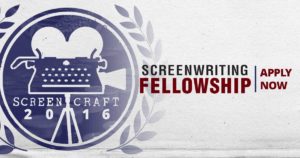
“In 2006, Crash, a contemporary film about racism made on a $6 million budget, shocked Hollywood, and its own creators, when it won Best Picture at the Oscars.”
So begins a recent Vulture article which recounts, via quotes by key players, the film's sometimes harrowing -- yet not entirely uncommon -- journey to the finish line.
The beginning
Crash is directed by Paul Haggis, and co-written by Haggis and Robert Moresco (a mentor for this year's Screenwriting Fellowship*).
Haggis had just been fired from his own television show, CBS’s Family Law, and wanted to try again to break into features. His then-wife, Deborah, prompted: “You know that TV-show idea you had? You should write it as a movie. You’ll win an Oscar.”
Haggis says: “She reminds me of this all the time.” He goes on to describe the project:
“It was an outline for a concept I’d written about how prevalent feelings of racism were in America; the decisions we make about people based on their look, race, and ethnicity. The stereotypes we pretend that we reject are ingrained in our DNA. I’d taken the concept around, but nobody wanted it. So I pulled out the 35-page outline again and remembered why I loved it so much. I called my friend Bobby Moresco and said, ‘I think this is a movie.'”

Together, Haggis and Moresco began to develop the idea into a feature film. Haggis continues:
“I sat at the keyboard and Bobby read the pages and threw out ideas. Then we’d rewrite. It was very quick. And then we got turned down by every financier in America and Canada.”
The greenlight
Finally Bob Yari came aboard. The producer-financier agreed to put up $7.5 million, contingent upon the filmmakers securing a number of movie stars for roles. They began attaching talent, and the movie was a go.

Describing the on-set experience, Moresco chimes in:
"[We] constantly pushed [the actors] for deeper, stronger, and more real. There wasn’t anyone who didn’t run with it. We went home every night pretty confident we got what we needed for the day. Paul may have felt differently at times [laughs]. But I think we felt like we were shooting the movie we wanted to shoot, amidst all the problems."

The screeching halt
The stress of the production caused Haggis to have a heart attack on the last day of shooting. Literally. He was taken by helicopter to the hospital, and sent into surgery. Here he describes what happened afterward:
"After my surgery, the doctor insisted I couldn’t go back to work for four months. I asked him how much stress he thought I would be experiencing sitting at home while another director was finishing my film. So we were back shooting a week and a half after my procedure with the understanding that I had to sit in my director’s chair at all times, and that my blood pressure had to be monitored every fifteen minutes."
The victory lap
When the film screened at Toronto International Film Festival in September of 2004, it received a thunderous ovation. Then Lionsgate picked up distribution of the film, opting for a wide release – which turned out to be quite fortunate, since bad reviews received in NY and LA publications could have thwarted the movie’s chances early on.
According to Haggis: “[T]he fact that people were affected by it, and Roger Ebert and a lot of the other important critics loved it nationwide, is what saved the film.”
Oprah Winfrey had the cast on her show that October, officially adding her seal of approval. Crash ended up with six Oscar Nominations, winning three: Best Picture, Best Original Screenplay, and Best Film Editing.

This quote from Robert Moresco offers a seasoned perspective:
"In the end, were we better than those other movies? No. Did we win the Oscar? Yeah. So what? Nobody wanted to make Crash. Nobody wanted to make Million Dollar Baby. Paul and I sat in his little office together every day, and we’d come up with these stories that we felt we loved and hopefully somebody else would love. And we stuck with it. I hope others take a lesson from all that. You just have to not give up. Nobody can stop you from writing, directing, or producing. Nobody. They can only stop you from getting paid. [Laughs.]"
*ScreenCraft is proud to feature Robert Moresco as a mentor for the 4th Annual ScreenCraft Screenwriting Fellowship.
Moresco’s other features include Million Dollar Baby (2005 Academy Award Winner for Best Picture), which he co-produced and developed with Paul Haggis; and 10th and Wolf, his directorial debut starring James Marsden and Giovanni Ribisi.
We're picking four screenwriters (TV or Film) for this 4th ScreenCraft Screenwriting Fellowship. If you'd like to receive personal mentorship from Robert Moresco (along with 3 other Academy Award-winners) apply to the Fellowship today!
Curious what happens during Fellowship week in L.A.? Read Inside the ScreenCraft Fellowship Experience.
Get Our Screenwriting Newsletter!
Get weekly writing inspiration delivered to your inbox - including industry news, popular articles, and more!



























